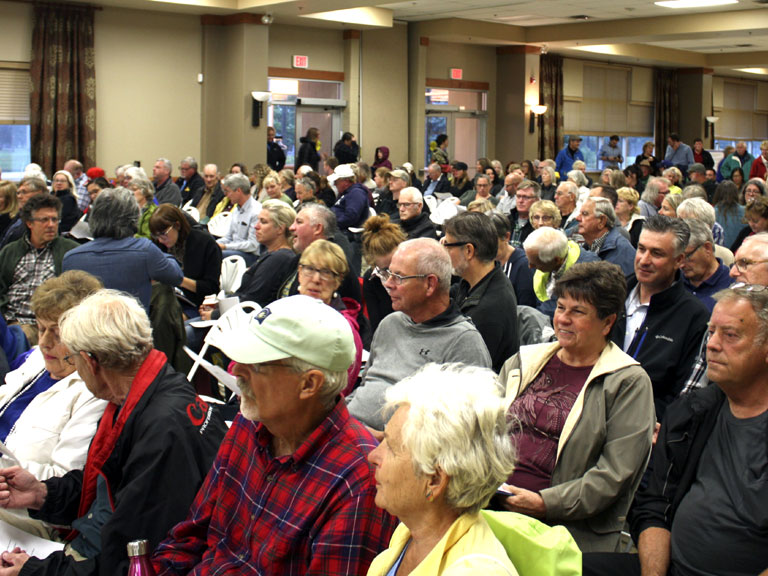County News
Specifics

New regulations for short-term accommodations
A special Committee of the Whole meeting was held Monday evening at the Wellington and District Community Centre, where a presentation was given by Greg Bender of WSP Consulting and Paul Walsh, Manager of Planning for Prince Edward County, regarding the regulation of short-term accommodations in the County. The purpose of the meeting was to receive the presentation, review draft proposed recommendations, and receive public comments and questions related to STAs (short-term accomodations) in the County. The meeting was well attended, with over 250 residents coming to see what the presentation and proposed bylaws entailed. This was also the first time that council was seeing this presentation, so everyone in the room was receiving the information at the same time.
The presentation laid out rules and guidelines that STAs would have to abide by in ways of licensing. They made a very clear definition between owner-occupied STAs and non-owner-occupied STAs. Most of the new regulations focused on non-owner-occupied STAs. New regulations also force houses with more than four bedrooms to go through a separate licensing process. Bender also stated in the presentation that future STAs would be granted a licence based on density of STAs in that area. Fifteen per cent was recommended as being the proper density percentage for STAs in residential areas. There would be significant fines for infractions of at least $1,000 and new owners would have to apply for a new STA licence if the property is sold.
Parking was also mentioned, and the new licensing bylaw would state that STAs be required to have one parking space per guest room. Three rooms would equal three parking spaces, and if those are not directly on the property,a licence may not be granted. Existing STAs would be able to apply for a licence even where maximum densities are exceeded, but would still have to meet all new bylaw and licence requirements.
One audience member asked how many staff would be enough to monitor so many short-term accomodation units.
Walsh says those units will not only be monitored on an ongoing basis under the bylaw, but perhaps also through a front-end initial sweep of licensing.
“There might be some added resources of a signficant extent for a short duration and then once people are licensed, we can scale down on those required dedicated resources, but those are all things that we are discussing and looking at and trying to figure out.” says Walsh.
Bender and Walsh put out a survey last May and received nearly 1,500 responses from the public and another 75 responses from industry. There were also two open houses in July 2018 in Picton and Wellington with close to 200 residents in total attending those meetings.
From those meetings they gained a wealth a data and approximately 100 questionnaires and letters were completed. The pair did an extensive amount of research for this presentation and the work did not go unnoticed by both council and members of the public. The questions and concerns from both sides lay in the finer details of the presentation, which unfortunately have not been ironed out yet. The purpose of the evening, according to Bender, was to present their information and everyone attending (council included) hearing it for the first time would be able to react and give feedback. By no means was this put forward asan iron-clad document and there was continual talk about being able to amend things as they move forward.
But, for some residents, the whole idea of licensing STAs does not sit well. Hilary Amolins owns and operates County Country Homes, a property management service based in the County. Amolins was immediately concerned about Section 4, paragraph 7 of the document which states the following:
“A Bed and Breakfast Establishment may provide and serve breakfast only. No other meal shall be offered or served on the premises. No cooking or cooking appliances shall be permitted in licensed rooms,”
Amolins found this part of the presentation quite offensive to the way he operates his establishments.
“Are you really telling me that I can’t share the privilege and pleasure of dining with my guests?” says Amolins, who sees lots of holes in what was put forth at the meeting. “This bylaw, as drafted, could destroy the tourism industry in Prince Edward County. By all means prosecute hosts who allow ignorant guests to disturb neighborhoods, but use the tools already at your disposal. Like the police. Like existing noise bylaws. Like common sense.”
The next steps are recommendations to the Committee of the Whole on September 27, with a detailed licensing bylaw in hand for that date and then a possible ratification by council on October 9.

This is critical: “Existing STAs would be able to apply for a licence even where maximum densities are exceeded, but would still have to meet all new bylaw and licence requirements.” STAs without the required parking should not be grandfathered.
While we’re at it. If an STA with two rooms is required to have two parking spaces, why was the same logic not applied when the Royal Hotel renovation was approved. The lack of parking for guests, hotel staff and those attending functions is going cause chaos in Picton.
Enforcement of existing by-laws would render this proposed new STA by-law unnecessary.